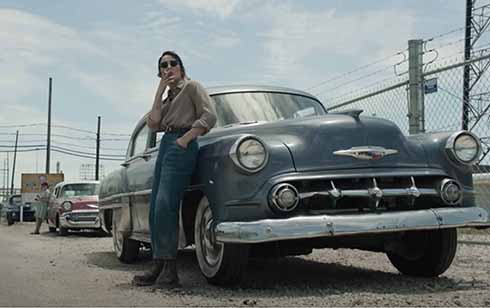 THE SECRETS WE KEEP. Starring: Noomi Rapace, Joel Kinnaman, and Chris Messina. Directed by Yuval Adler. Rating Classification MA15+. Restricted. (Strong themes, violence, sexual violence and coarse language). 98 min.
THE SECRETS WE KEEP. Starring: Noomi Rapace, Joel Kinnaman, and Chris Messina. Directed by Yuval Adler. Rating Classification MA15+. Restricted. (Strong themes, violence, sexual violence and coarse language). 98 min.
This American mystery thriller is based on a screenplay written by Isreali Director, Yuval Adler, and American actor-writer, Ryan Covington. It tells the story of a woman who takes revenge on a man she thinks was responsible for war crimes against her, years before. The movie is not to be confused with the work, of the same name, by multiple authors (eg, by Jonathan Harvey in 2015), or the film version of the romantic tale, The Secrets We Kept (2019).
The film is an emotional thriller that combines the talents of two well-known Swedish actors – Noomi Rapace (best known for her lead role as Lisbeth Salander in the 2009 film, The Girl With The Dragon Tatoo), and Joel Kinnaman. Rapace is executive co-producer of the movie.
In the film, Maja (Noomi Rapace) lives with her husband, Lewis (Chris Messina), in a small town in suburban America, and she wants to rebuild her life after a traumatic past. She is moderately happy with her life, after the trauma of what she endured in the immediate aftermath of WWII.
Maja has chosen to keep her tragic past from her husband, which gives special significance to the title of the film. The secrets revealed in the film are many, however, and the plot-line tellingly projects their complexity, as the camera roams over past and present scenes. Maja knows 'her life will never be normal' after being terrorised as a young girl by Nazi soldiers.
When going about routine life in her town, and while playing with her child, Maja sees a neighbour, Thomas (Joel Kinnaman), in the street, and thinks she recognises him as the German soldier who brutalised her and her family, 15 years earlier. She hears him whistling in a familiar way. Traumatised by her memories as a young girl, and raped and brutalised by the Nazis who targeted her Romani family, she begins stalking him. At wits end, and urged on by Thomas’s whistling, Maja decides to kidnap Thomas to take revenge. She knocks him unconscious, puts him in the boot of her car, and ties him up in the cellar of her house.
Thomas denies he is the person Maja thinks he is, and Lewis, unconvinced by her claims and traumatised by them but pushed into complicity, urges his wife to let him go. Maja, however, remains resolute, and wants Thomas to confess to the crimes she alleges he committed. She wants him to admit guilt, redeem himself, and earn the right for her to release him. Aggression towards Thomas is used by Maja as a way of seeking change both in herself and him.
After some loose moments, the film picks up pace. The major dramatic power of the movie resides in the difficulty of knowing who is telling the truth – Maja, who endured horrific traumas in her past, or the person who was responsible for them? What is the path out of revenge that can best achieve forgiveness, and who wants what, for what reasons? Lewis doesn’t 'know (who or) what to believe'. The film moves to a startling conclusion as Maja and Lewis, at moral cost to themselves, move forward to live together. Doomed to unhappiness, they await the inevitable.
This is a tightly directed thriller that frequently shifts direction to push viewers to contemplate what they might do if they were trapped in the same situation. Under Yuval Adler’s discerning eye, and with impressive acting by a group of accomplished actors, the film indicates there is no definitive solution to many of the questions it raises, but it communicates that it is important to consider answers to them.
The movie’s violence demonstrates the effects of aggression on the victims of it, and on those who inflict it. It is a compelling movie that urges answers to the questions it raises, and it invites serious thought about the correct way forward in a morally challenging world.
Peter W. Sheehan is Associate of Jesuit Media
The Reset Collective
Released on the Palace cinema network from 17 September 2020, and streaming on Foxtel from 21 October 2020.